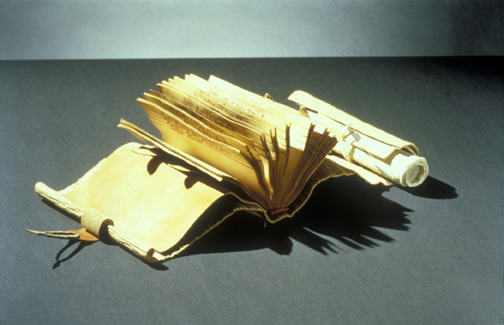
So, I'd say I've reached the apex of my illness. Fortunately, it's not a very high apex, coming to a point as it does at "cough and scratchy throat, with vague headache." Fine (or not, if you see what I mean). I just hope this really is the apex.
Today I went out to lunch with a friend who is a Byronist. In the course of our conversation, he informed me that some villa in Pisa where Percy and Mary Shelley had lived, over the road from Byron, had been torn down (or maybe it was a villa somewhere else: it's vague now), so now one could no longer go or see where the Shelleys had lived. Later on, he told me about a lecture he'd attended, given by my lovely friend Jerome McGann, in which McGann said people ought to embrace the internet wholeheartedly, and a medievalist from Cambridge stood up and said, "Yes, but the monks decided to embrace that new technology 'the book,' and they ended up tearing up scrolls and using them to make book boards and book covers," the implication being that this was a terrible loss.
I never know how I feel about this mourning for history. On the one hand, I understand the desire to preserve everything, and to walk where those I admire or am intrigued by have walked; I comprehend the desire to preserve and visit the past, the sense that any loss is a loss to potential thought or simply to experience and knowledge.
On the other hand - and this side of me cries out more strongly in these situations - I want to say, "So what?" There are two reasons for this. Leaving aside the basic fact that I don't much care where Percy Shelley lived and have no desire to tread the magic boards that once held his precious weight, as a person who has trod similar boards I am deeply suspicious of the experiential value of this exercise. You can stand where Anne Boleyn stood, or tread softly into a room where John Keats lived, hearing the floor creak beneath your feet, and sit in isolated silence in the very chair he sat in, in that very room - but unless you are able to think the very thoughts that Anne Boleyn or John Keats thought, you aren't replicating their experience. By doing these things you can get a sense of what it's like to be in those spaces, and you can say, "Ah, I see how, sitting in this chair, one would begin to yearn for sleep," or, "Look how high this scaffold is! She must have felt very small and alone," but what you're really doing is having your own experience of what that experience might have been like. I believe there's some value in that, but I'm not sure how much.
My second reason is entirely different, I think, and it may in fact be two reasons folded together. For one thing, it seems to me that such losses (of villas, of books) are part of evolution - not to say part of life. Yes, we lose, but with that losing we move forward; we gain, too. That doesn't mean I don't mourn the loss (I do, I do), but I perhaps mourn less for it than I might. Septimus Hodge would perhaps say, We can only hold so much in our arms, and in order to pick up we must shed. But the picking up brings us new experiences, new life: newness. And, with certain exceptions (the ugly building, the empty-headed remake), I think those new things are good. Which balances out the losses.
Furthermore, without loss there would be no mystery, and that (how Byronically!) would be the greatest loss of all. Here I can call Septimus Hodge to my aid, because at the end of Arcadia he says, "When we have found all the mysteries and lost all the meaning, we will be alone, on an empty shore" (which, by the way, I think may be a reference to both Keats and Matthew Arnold). Those scrolls that scholars must unpick from book bindings; those buildings and the moments that occurred within them that biographers and critics must recreate in their minds, they keep uncertainty in the world. When they were able at last to say definitively that Anna Anderson was not the Grand Duchess Anastasia, I was sorry. I don't want to know whether or not Napoleon was poisoned on St. Helena. There should be mysteries. There should be mysteries not just because they keep us guessing, keep us thinking, but because there should be things we don't know. I'm not sure why I believe this. It might be because I don't think humans should become too egotistical (I don't), or it might simply be because I think life should hold some mystery. It does us good, in some way, not to know, or not to be sure we know.





No comments:
Post a Comment